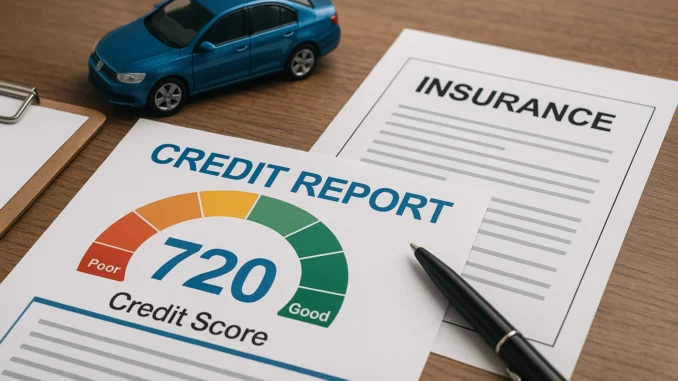
Introduction: Why Your Credit Score Matters for Auto Insurance
When most people think about their credit score, they connect it to getting approved for a mortgage, credit card, or personal loan. However, your credit history also plays a surprising role in how much you pay for auto insurance. The relationship between credit score and auto insurance has become a major factor in determining premiums across the United States.
Insurance companies use what’s called a credit-based insurance score to evaluate risk. In simple terms, they believe that drivers with stronger credit are statistically less likely to file costly claims. As a result, a good credit score could mean lower premiums, while a poor score may lead to higher costs.
This article breaks down exactly how your credit score influences auto insurance rates, why insurers use this method, and—most importantly—what you can do to improve your situation.
What Is a Credit-Based Insurance Score?
A credit-based insurance score (CBIS) is similar to your traditional credit score but is tailored specifically for insurance purposes. Instead of predicting whether you’ll repay debt, it predicts how likely you are to file an insurance claim.
Factors that influence your CBIS include:
- Payment history – Consistently paying bills on time lowers perceived risk.
- Outstanding debt – High credit card balances can negatively impact your score.
- Credit history length – Longer histories generally suggest more stability.
- New credit inquiries – Too many hard pulls can lower your score.
- Credit mix – Having different types of credit (loans, credit cards, mortgages) helps.
Insurers then use this score along with other factors like driving history, location, age, and type of vehicle to calculate your premium.
(Outbound link: Experian – How credit-based insurance scores work)
Why Do Auto Insurers Use Credit Scores?
Insurance companies argue that credit scores are strong predictors of risk. Studies have shown that drivers with poor credit scores tend to file more frequent and more expensive claims than those with excellent credit.
For example, according to a study from the Federal Trade Commission, there’s a clear correlation between lower credit scores and higher claim costs. Insurers use this data to set fair pricing models, rewarding lower-risk drivers with cheaper premiums.
From their perspective:
- Good credit = responsible behavior = lower likelihood of risky driving and claims.
- Poor credit = financial instability = higher likelihood of filing claims.
This practice, however, has sparked debates about fairness and potential discrimination—something we’ll explore later in this article.
States That Restrict or Ban Credit Score Use
Not every state allows insurers to use credit scores when setting rates. Some states have banned or heavily restricted the practice to prevent unfair pricing.
States that prohibit or limit the use of credit scores for auto insurance:
- California – Credit cannot be used to determine rates.
- Hawaii – Prohibits using credit score for auto insurance.
- Massachusetts – Insurers cannot use credit history in auto insurance pricing.
- Michigan – Limited restrictions apply to prevent over-reliance on credit scores.
If you live in one of these states, your premium won’t be directly tied to your credit score. For others, however, your financial habits could significantly affect your monthly payment.
How Much Can Your Credit Score Affect Your Auto Insurance Rates?
The difference can be dramatic. According to NerdWallet, drivers with poor credit scores may pay up to $1,000 more per year for the same coverage compared to drivers with excellent credit.
To give you perspective:
- Excellent credit (750+) – Drivers may receive the lowest premiums available.
- Good credit (700–749) – Slightly higher but still competitive rates.
- Fair credit (650–699) – Noticeable increase in premiums.
- Poor credit (below 650) – Can face significantly higher insurance costs.
Some insurers even place drivers with poor credit into higher-risk categories, regardless of a clean driving record.
Credit Score vs Driving Record: Which Matters More?
Many drivers assume their spotless driving record should guarantee low insurance costs. While driving history is still a major factor, credit score can sometimes outweigh it.
For example:
- A driver with excellent credit but a minor speeding ticket may still pay less than a driver with poor credit and no violations.
- This means improving your credit score can sometimes save you more money than avoiding minor driving infractions.
However, major violations like DUIs, reckless driving, or multiple accidents will always have a bigger impact than credit alone.
The Fairness Debate: Is It Right to Use Credit Scores?
Critics argue that linking credit score and auto insurance is unfair, particularly for drivers who may have low credit due to medical debt, job loss, or other non-driving-related factors. They claim it disproportionately affects lower-income households, even when those drivers have safe driving records.
Consumer advocacy groups continue to push for reforms, and some states are considering new laws to limit this practice. Until then, your best strategy is to improve your credit profile while maintaining a safe driving record.
How to Improve Your Credit Score (and Lower Auto Insurance Costs)
If you’re stuck paying higher premiums due to credit, the good news is you can take steps to improve your situation.
1. Pay Bills on Time
Payment history is the single most important factor in both credit and insurance scores. Set reminders or automate payments.
2. Reduce Credit Card Balances
Keep your credit utilization ratio under 30%. The lower, the better.
3. Avoid Unnecessary Hard Inquiries
Don’t apply for too many new credit accounts at once.
4. Maintain Old Accounts
The length of your credit history helps—avoid closing old credit cards.
5. Check Your Credit Report Regularly
You’re entitled to a free credit report annually at AnnualCreditReport.com. Dispute any errors that may be dragging your score down.
Improving your credit doesn’t just help with auto insurance—it also impacts mortgage rates, loan approvals, and even job opportunities in some industries.
Other Factors That Affect Auto Insurance Premiums
While credit score is important, it’s not the only factor insurers consider. Your rate is also influenced by:
- Driving history – Accidents, tickets, and violations.
- Age and gender – Younger drivers usually face higher premiums.
- Location – Urban areas often have higher rates than rural ones.
- Type of vehicle – Luxury cars and sports cars cost more to insure.
- Coverage level – Choosing full coverage vs. minimum liability.
- Mileage – The more you drive, the higher the risk.
This is why two people with the same credit score might still pay very different premiums.
Tips to Save on Auto Insurance Beyond Credit Score
Even if your credit score isn’t ideal, you can still reduce your premiums by:
- Shopping around – Compare quotes from at least three insurers.
- Bundling policies – Combine auto and homeowners/renters insurance.
- Increasing your deductible – Higher deductibles lower monthly costs.
- Taking defensive driving courses – Some insurers offer discounts.
- Asking about discounts – For safe driving, good students, low mileage, etc.
(Internal link: How to Lower Your Car Insurance Premiums Without Sacrificing Coverage)
Conclusion: Take Control of Your Credit and Insurance Costs
Your credit score and auto insurance premiums are more closely linked than many drivers realize. A strong score could save you hundreds—or even thousands—per year, while a weak one could cost you more despite safe driving habits.
The good news is that credit isn’t permanent. With smart financial habits, you can improve your score over time and unlock better auto insurance rates. Pairing a strong credit profile with safe driving is the best way to keep your costs low while protecting yourself on the road.

Leave a Reply